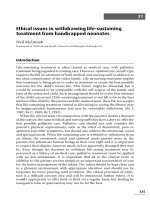Nutrition Food in Your Life
Bạn đang xem bản rút gọn của tài liệu. Xem và tải ngay bản đầy đủ của tài liệu tại đây (1.56 MB, 118 trang )
Ch. 5
Nutrition
Food in Your Life
Why do you eat?
• Nutrients-substances in
food that your body needs
to function properly to
grow, to repair itself, and
to supply you with energy.
• Eating habits stem
from both a
physical need
(hunger) for food
and a
psychological
desire for food
(appetite).
• Recognize the
difference
between the
two helps you
make more
healthful food
choices.
Your Body’s Physical Need
for Food.
•Hunger is
a natural
drive that
protects
you from
starvation.
• The most
basic reason
for eating is
physical.
• Stimulated
nerve ending
in the
stomach
signal hunger.
Your Mind’s Desire for
Food
• Appetite is a
desire, rather
than a need,
to eat.
• Appetite is a
learned
response to
food.
• Appetite is shaped by factors
in your environment (culture,
family, friends, advertising,
time and money) and by your
emotions.
Your eating habits
• Food choices can
reduce major risk
factors for chronic
diseases, including
obesity, high blood
pressure, and high
blood cholesterol,
heart disease, stroke,
and cancer.
Nutrition Throughout
Your Life
• Nutrition-the process by which
the body takes in and uses
food.
• As you grow and develop you
may need nutrients in different
amounts.
• Nutrients help you feel and
look your best, have
energy and stay mentally
alert.
• Nutrients help ward off
diseases including chronic
diseases.
6 Nutrients
• Carbohydrates= 4 cal./gm.
• Protein= 4 cal/gm.
• Fat= 9 cal/gm.
• Vitamin= 0 cal/gm.
• Minerals= 0 cal/gm.
• Water= 0 cal/gm.
• Explain the difference
between hunger and
appetite.
• What factors influence
decisions that affect food
choices?
• Why is good nutrition so
important during
adolescence?
• Give three examples of
how your culture and
family have influenced
our eating habits.
Carbohydrates
• Carbohydrates are the sugars
and starches found in foods.
• 55%-65% of your diet should
be carbo.
• Your diet should be mainly
made up of complex
carbohydrates.
•Main source of
fuel.
•Extra carbo.
stored as fat.
•4 calories per
gram.
Simple Carbohydrates
• Sugars present
naturally in fruits,
some vegetables
and milk.
• Americans eat
there own weight in
sugar every year.
Complex Carbohydrates
• Starches found in great
supply in rice and other
grains, seeds, nuts, legumes
(dried peas and beans), and
tubers (potatoes).
• Chemically a more complex
carbohydrate.
• They are
made up of
many sugars
linked
together.
• Digested,
starches
break down
into sugars.
Role of Carbohydrates
• Before your body can use
carbohydrates it must first
convert them to glucose.
• Glucose- a simple sugar.
• Glucose is the body’s chief
fuel.
• Glucose not used
is stored in the
liver and muscles
as glycogen.
• Glycogen is
converted into
glucose when the
body needs it.
Fiber
• Special form of complex
carbohydrate.
• Tough stringy part of
vegetables, fruits and grains.
• Cannot be digested.
• Bran, roughage,
• cellulose
Fiber
• O calories per gram.
• Moves waste through
digestive system.
• May reduce the risk of
certain cancers.
– Colon
– Breast
• Instrumental in
controlling
diabetes, blood
cholesterol,
blood sugar
levels and
obesity.
• It is recommended
that you eat
25
grams of fiber a
day.









